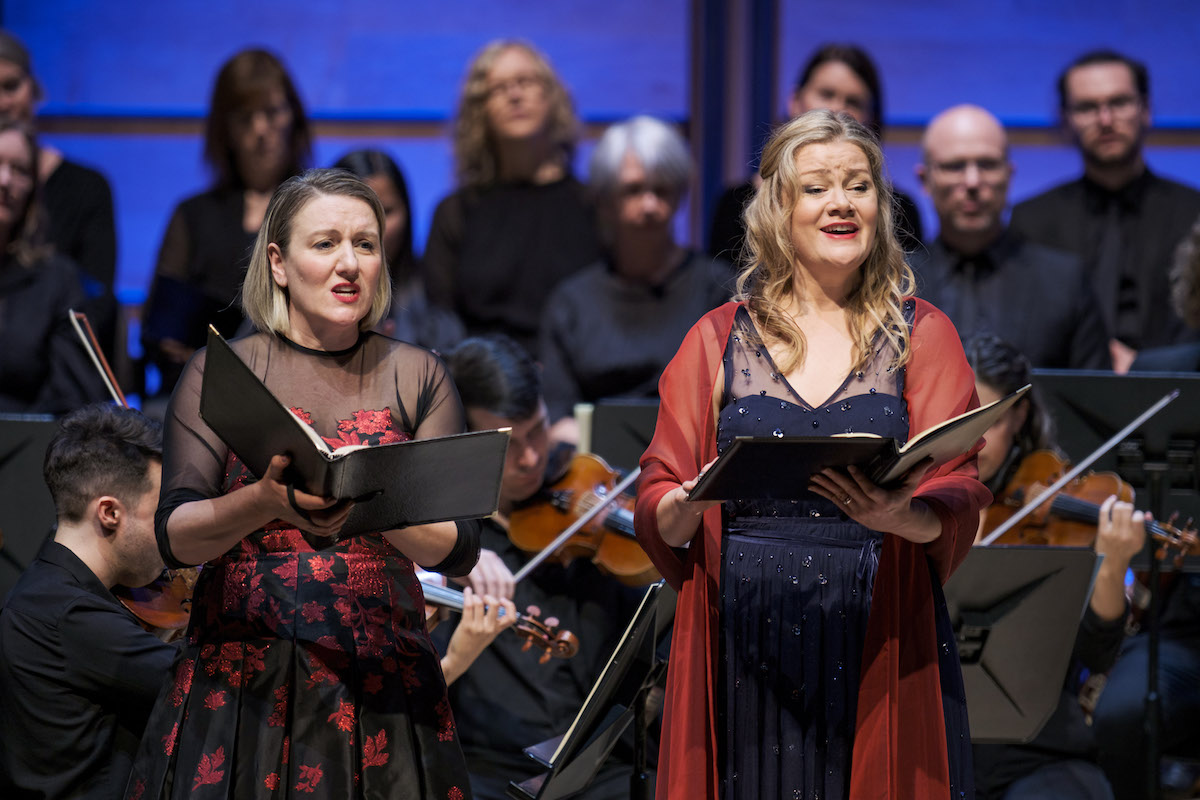Exuberance, power and raw energy marked the start of Sydney Chamber Choir’s 2024 season with Artistic Director Sam Allchurch conducting a tightly-performed program culminating in a triumphant assault on the Himalayan heights of Mozart’s Requiem, superbly accompanied by the 22-strong Muffat Collective Orchestra led by violinist Matthew Greco.
But before that work took out the second half, we were treated to some impressive peaks in the foothills with three glorious works to start the evening off.

Sam Allchurch conducts Sydney Chamber Choir and The Muffat Collective Orchestra in Mozart’s Requiem. Photo © Robert Catto
The 27 voices of the SCC divided for J.S. Bach’s jubilant motet Singet dem Herrn ein neues Lied (Sing to the Lord a new song), with breath control, intonation and precision all put to the test in the opening section in which lines and phrases are joyfully tossed from one side to the other with Anthony Abouhamad’s chamber organ lending support.
The welcome calm of the second part, the text of Psalm 149 set as a 16th Century Lutheran hymn, highlighted the choir’s beautiful tonal blend, before the bubbly, challenging final alleluias.
WA composer Iain Grandage set Australian poet Chris Wallace-Crabbe’s charming humanist prayer Why Do We Exist? – in which a child sits “quiet as a moth” in a garden – for an SCC commission in 2016 as a wedding gift from a couple to their son. “My aim … was to build something with as much beauty as I could imagine from the simplest DNA – a double helix of contrary motion scales constantly rising in the upper parts and ever-descending in the bass line,” Grandage said.
It opens with high sliding strings imitating a blackbird “warbling grandly” with wrens and wattlebirds in attendance, before the sopranos and tenors enter over the slow rising arc from the choir and orchestra. It builds to a melodic climax before falling away again and ending where it started with birdsong.
It set the scene neatly for the final work of the half, Mozart’s gemlike Ave, verum Corpus, composed just a few months before the Requiem. Surely, no one else has expressed so much choral beauty and perfection in a mere 49 bars, and Allchurch ensured that his choristers gave it full value.

Celeste Lazarenko and Helen Sherman. Photo © Robert Catto
Four local soloists from the top drawer were on hand for the Requiem. Soprano Celeste Lazarenko and mezzo Helen Sherman renewed their winning partnership from the recent Australian Haydn Ensemble’s performance of Pergolesi’s Stabat Mater, and English-born tenor Richard Butler and bass David Greco (brother of concertmaster Matthew) are both popular regulars.
The Requiem is one of the most picked over masterpieces in classical music. So many legends true and false have grown around it, thanks in no small part to Peter Shaffer’s play Amadeus, and composers of various hues have sought to improve on Franz Xaver Süssmayr’s rapidly penned completion of the work under the eagle eye of Mozart’s widow Constanz.
But all of that gets blown away when you hear a first-class live performance of the work, and this was one of them.
The fearsome anger and energy of the Dies irae, the might of Rex tremendae and the majestic sadness of Lacrimosa all showed the choir at its best, while Lazarenko’s soprano shone in her solos and the other soloists melded smoothly in the four quartets, joined by some fine trombone from Nigel Crocker in Tuba mirum.
The smaller forces of the orchestra allowed the listener to enjoy the counterpoint and interweaving instruments in a more transparent way with the basset horns of Andrew Doyle and Alisha Coward being thrown, refreshingly, into sharper relief than is usually the case.
Matthew Greco led his extended forces with characteristic aplomb and good humour and the whole concert made for a stirring start to the season for Allchurch and his troops.











Comments
Log in to join the conversation.